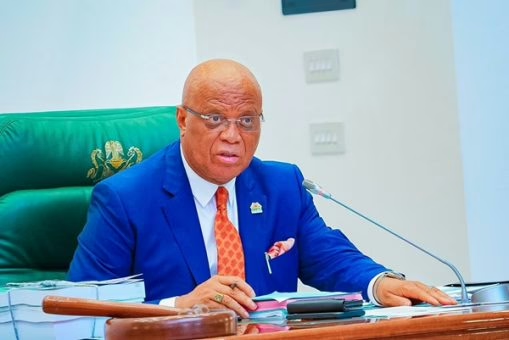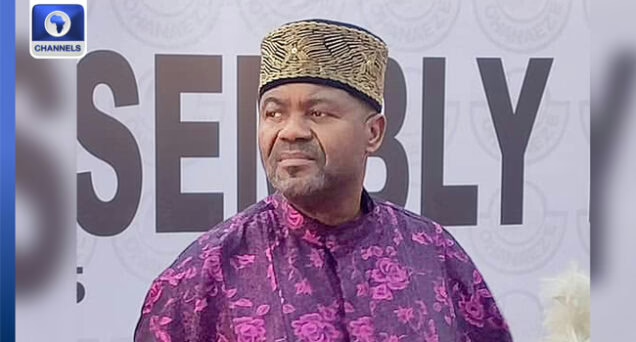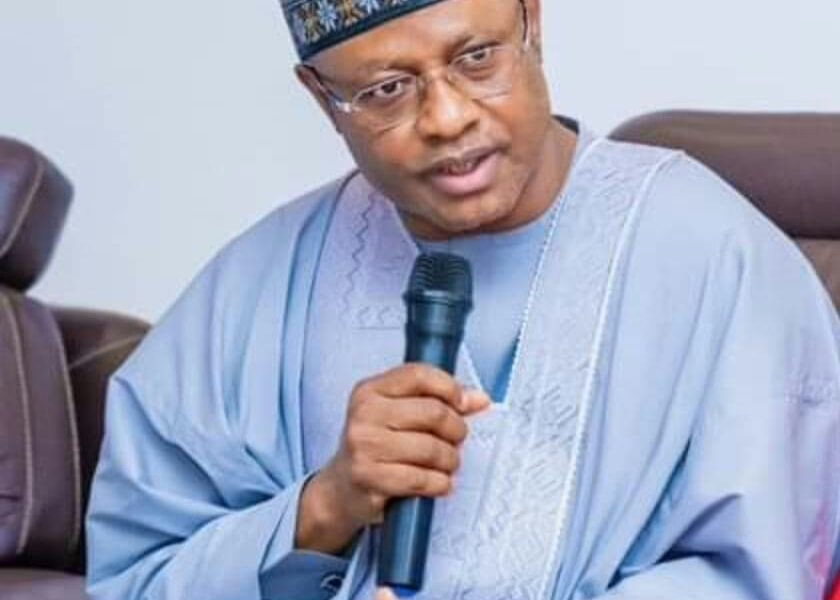A bumpy ride on a tiger’s tail is how many have described the first 12 months of Bola Ahmed Tinubu’s presidency. It’s a cocktail of unfulfilled promises, worsening insecurity, a near comatose economy, asphyxiation of citizens via unending taxes, while several other oddities that previous administrations failed to nip in the bud are still flourishing. With the economy on tenterhooks and a bunch of hapless citizens bearing the pains of systemic rigidities, the judiciary is alleged to have performed below par failing to inspire confidence, public trust with its actions and inaction. The political class has also remained unrepentant and patently self-centred in its approach to governance, just as the spectre of insecurity has loomed as large as it can get. JOSEPH ONYEKWERE, MUYIWA ADEYEMI, GEOFF IYATSE, and IYABO LAWAL, write that Tinubu’s first year in the saddle has been a year like no other.
A slew of draconian policies preceded by the knee-jerk removal of subsidy on petrol by President Bola Ahmed Tinubu on his first day at work, as well as, the floating of the naira, has not only exerted seismic pressures on the polity, but they have also aggravated the economic hardship faced by Nigerians in the last 12 months.
Indeed, many are of the view that the administration has foisted on Nigerians, a reign of hopelessness, and uncertainty, which has in turn birthed forlorn hopes, shattered dreams, unfulfilled expectations, and so on.
But as if they dwell on another planet where suffering is alien, representatives of the administration have continued to pump up the volume when reeling out “significant strides” witnessed in various sectors of the economy under Tinubu’s stewardship.
Using the words of the father of modern economics, John Keynes, economic reforms often trigger short-term shocks and social dislocations but promise gains in the long term, during which “we are all dead.”
Here lies the puzzle of President Tinubu’s aggressive economic reforms – the neoliberal market-led models he has foisted on Nigerians in the past year. If the objects of the reforms “are all dead” before tomorrow comes with the envisaged long-term gains, of what use are the reforms?
Unaffordable cost of ‘reforms’
Unlike Keynes’ postulation, Nigeria’s case is not philosophical. There is no current data from the famous misery index ranking, a measure of countries’ totality of anguish from unemployment and inflation. Even before Tinubu took the reins, the misery index was pegged at about 70 per cent, even though the popular Hanke’s ranking put it at 56.2 per cent.
Most economists, today, do not trust that grossly politically influenced statistics are credible enough for computing the welfare level of the citizens. For one, at five per cent, the unemployment level says little or nothing about the level of joblessness in the country. The inflation rate is also extremely controversial with independently computed data suggesting above 100 per cent inflation rate.
But beyond the complex and often confusing economic jargon in the name of computation, Nigeria’s misery level can be felt and seen at homes, and on the streets. As some folks have observed, begging does not have any social stigma anymore. Responsible men, and women in noble professions now beg with ease because they need to meet most basic needs, which they cannot afford with their value-eroded income.
A lens to understanding the cost-of-living crisis is to place the national minimum wage side-by-side with the prices of staple food.
A three-month minimum wage (N90,000) can only buy a 50-kilogramme bag of rice in the open market, while a daily minimum wage can only afford an adult, a healthy diet for which the National Bureau of Statistics (NBS) estimated at N982 as of March this year. If anything has changed between March and now, the prices of tomatoes, oil, vegetables, fish, and other ingredients for preparing a healthy meal have shot up.
The figures thrown into the open by representatives of the government in the ongoing minimum wage negotiation are most demeaning. If all minimum wage earners do with their incomes is eat in the office during working hours while shelter, clothing, and every other thing that accounts for a comfortable living comes at a zero cost, they still cannot cope with the N48,000 offered at first instance. From foreign exchange rate and inflation loss analysis, N48,000 today is less than half of N30,000 in 2019 when it was adopted.
Critics questioned Tinubu’s sincerity when he, during the June 12, 2023, commemoration said: “I feel your pains.” In his famous speech, the president echoed the socioeconomic philosophy of socialists in a trending video: “Let the poor breathe, don’t suffocate them.”
But in reality, the poor cannot breathe. Inflation (which stands at a three-decade high (of 33.7 per cent), the bleeding naira (which raked is now back to its tagline – worst performing currency), ravaging poverty, falling income, rising insecurity, and other social ills) are suffocating both the rich and the poor.


The masses still awaiting ‘renewed hope’ promises
As suggested by Keynes, market failure, the albatross of the invisible hand of economics is killing them, and most of them can only hope that long-term gains happen in the lives of their grandchildren.
Those who were old enough to see the outcome of the botched Structural Adjusted Programme (SAP) – a Bretton Woods-prescribed model – have seen the turmoil in its different phases. But the country had not fallen deeper than the past decade.
For instance, in the eight years that ex-President Muhammadu Tinubu was in office, the naira lost about 70 per cent of its value against the dollar while the price level increased by 220 per cent, from 170 points to 540 points.
The unemployment rate went from 7.5 per cent to 33.3 per cent until the NBS stopped releasing official data just as the fiscal deficit rose from less than N1 trillion to N7.4 trillion.
Long before Buhari left office, the World Bank and the International Monetary Fund (IMF) alongside local neoliberal economists, advocated pro-market reforms and subsidy removal as necessary options for addressing the structural and endemic challenges. Buhari, a socialist, stuck to a “model that served Nigeria’s interest.” He flirted with the recommendations of the free-market advocate such as when he signed the Petroleum Industry Act (PIA) with a major clause on subsidy removal but held back at the realisation of the intent of the legal document directing the infamous suspension of the act.
But Tinubu, a bold reformer as his advisers have described him, pulled the plug on fuel subsidy minutes after he took the oath of office. Consequently, prices of essential commodities spiked by nearly 200 per cent in hours, and every other thing followed.
A year after the decision and promise to fix the local refineries were disclosed, prices of fuel are heading to a 300 per cent year-on-year increase in some parts of the country. Yet, public refineries have remained comatose.
The government and citizens now look forward to the full operation of the Dangote Refinery, where the government acquired some equity in the most opaque manner to save the country from the pangs of fuel importation, with its associated leakages. Still, Dangote cannot source crude locally as the Nigerian National Petroleum Company Limited’s (NNPC) commitment through crude-backed loans and swap program leaves little or nothing for sale.
On the other hand, fuel subsidy removal woes were complicated by the liberalisation of the FX market. From a trading band of N460/$, the naira has fallen to about N1500/$ and even crossed N1600/$ at the official market in March. Essentially, the naira has lost about 70 per cent of its value in one year – the same margin it lost in Buhari’s eight-year presidency. Of course, a falling naira is like a falling knife on Nigeria, on several fronts, the least being inflation.
With claims that the Federal Government is paying N600 billion monthly as fuel subsidy, there is a tension that the FX reform-triggered naira loss has cancelled out the supposed gain of subsidy removal, pulling Nigeria back to the pre-Tinubu era.
Sadly, the Central Bank of Nigeria (CBN) has returned to dollar control and rationing while trading the local economy for hot dollars to stabilise the currency market.
On both counts, the World Bank and the IMF are already grumbling – over the return of FX market control and fuel subsidy.


Chaotic scene of palliative distribution
Nigeria seems to have fallen back into the abyss while nothing has changed, except that rises have doubled or tripled in the past year while the government continues to sustain age-long rigidities that have stifled economic growth and frittered away employment opportunities with taxpayers’ money.
Judiciary at crossroads, fails to inspire confidence, public trust
In the last year, the judiciary has also been on the crucible of public scrutiny, with the first litmus test faced by it starting shortly after the February 25, 2023, presidential election.
When it decided on what can best be described as the most competitive and tension-soaked presidential election in the Fourth Republic in favour of the incumbent and flag bearer of the All Progressives Congress (APC) on October 26, 2023, its reputation further sagged. The preponderance of public opinion was that the Independent National Electoral Commission (INEC) failed to abide by its own rules with its failure to upload the election results in real-time. Consequently, many hoped that the judiciary would either set aside the result of the election or order a rerun.
But that didn’t happen as the apex court maintained that INEC rules were not laws, even as it adduced sundry reasons in dismissing different legs of the petitions to the chagrin of supporters of the presidential candidates of the Peoples Democratic Party, and that of the Labour Party, Alhaji Atiku Abubakar, and Mr Peter Obi, who had mounted “all eyes on the judiciary” both online and offline in an attempt to keep that tier of government on its toes.
Again, before the current Chief Justice of Nigeria (CJN), Justice Olukayode Ariwoola came into office, there was no full complement of justices at the Supreme Court. The full complement of the court, according to the 1999 Constitution of the Federal Republic is 21, but owing to death and retirement, it is reduced to 11. Following the retirement of Justice Musa Dattijo Muhammad, in October 2023, the number further depleted to 10.
But due to public outcry, 11 more Justices were appointed and sworn in on February 24, 2024, to ensure a full complement at the apex court.
Curiously, during Justice Muhammad’s valedictory session on October 27, 2023, he opened a can of worms in a one-of-its-kind acerbic speech that was regarded by pundits as being inconsistent with judicial conservatism and taciturnity.
He affirmed systemic rot in the judiciary and also accused the CJN of abusing the powers of his office.
Within the period under review, nepotism, favouritism, abuse of office, and corruption appear to have burrowed deeper in the judiciary as far as judicial appointments are concerned.
Human rights lawyer and social critic, Prof Chidi Odinkalu, consistently accused senior judicial officers of these and more in appointments into the bench, stressing that they have not been transparent and merit-based.
Odinkalu’s claims are not unfounded as the CJN, the President of the Appeal Court, the Chief Judge of the Federal Capital Territory (FCT), their predecessors, and some politicians successfully got their children, wives, or relatives selected for appointment to the bench to the detriment of other brilliant Nigerian lawyers without such privileges.
Convener, Access to Justice (A2J), Joseph Otteh believes that the judiciary has worsened further, across all major indicators in the last year.
Otteh, whose NGO assesses the performance of the justice sector said there has been such a phenomenal loss of public trust in the Judiciary now than ever before.
“We think the Judiciary, more than anyone else, has done more to hurt its public perception, and the reabsorption of previously dismissed, or compulsorily retired judges has only worsened its image,” he said.
Also, the Convener of Fight Against Corruption in the Judiciary and Citizens Support for Lower Courts, Adebayo Akinlade, said that how judicial appointments have been made has been largely shrouded in controversy.
He aligned with Odinkalu that beneficiaries of such appointments have largely been relatives of those who appointed them. The heads of courts, he stated, are replacing themselves with close family members and this is not a good sign for the system.
“It is no longer a question of whether those appointed are competent; it is now obvious that it is about being related to those in the judiciary or political power. Aside from that, the judiciary has focused more on election tribunals since last year and we have seen a lot of other cases both civil and criminal suffer because of this,” he pointed out.
Notwithstanding the drawbacks, there is some cheery news too as judicial officers will soon begin to earn a living wage. This is because the National Assembly has passed the Judicial Office Holders (Salaries and Allowances, etc) Bill, which reviews judicial salaries, which was last increased in 2008.
The bill, if signed into law by President Tinubu, provides a basic yearly salary of N51.16 million for the CJN, while other Justices of the apex court earn N50.56 million. The President of the Court of Appeal will earn N50.54 million, while other justices of the court would earn N44.72 million. Also, while heads of courts of first instance earn N42.32 million, other judges under them will earn N36.84 million yearly basic salary.
Besides their reviewed emoluments, the judiciary got approval for a uniform retirement age for all judges. Judges of high courts before that review retire at 65, while those of the Appeal and Supreme courts will bow out at 70. With the new order, all judges will now retire at 70. In addition, the president also approved N37.2 billion for the construction of a new building for the Abuja Division of the Court of Appeal.
Insecurity thrives despite a groundswell of promises
With the country appearing to be at sea and non-state actors taking up territories in the dying days of President Muhammadu Buhari, Tinubu during electioneering vowed to give insecurity a bloody nose.
But, a year into his presidency, banditry, kidnappings, and other violent crimes, including killings have continued to flourish.
Tinubu, who described security as the “bedrock of a prosperous and democratic society,” had assured Nigerians that if elected, his “administration will be committed to permanently securing the safety, freedom, and prosperity of all Nigerians.”
To achieve this, Tinubu in the 80-page document, containing multi-sectoral policy options tagged, “Renewed Hope 2023 – Action Plan for a Better Nigeria,” promised to further equip the armed forces with more modern hardware and needed technological support, even as he also said that the police will be reformed to fully take responsibility for internal security.
Drawing from his experience as a governor of Lagos State, and how he improved the security of the state, he said, “When I entered office as governor of Lagos, the state was crime-ridden. Safety was uncertain. The population was fearful. With bold, no-nonsense crime prevention reform and creative institution building, we won back our state. It became a safe and secure place to live and to do business. I shall bring the same determined, problem-solving spirit to solving insecurity at the national level.
“Security shall be the top priority of our administration because neither prosperity nor justice can prevail amidst insecurity and violence.
“To effectively tackle this menace, we shall reform both our security doctrine and its architecture. We shall invest more in our security personnel, and this means more than an increase in number. We shall provide better training, equipment, pay, and firepower.”
But despite all the promises, the only noticeable achievement in the area of security in the last year was the significant increase in the budgetary allocation to Defence, But with no commensurate result. The Defence budget for 2024 is N1.647 trillion, which is the highest in the last four years as the sector got N1.383 trillion in 2023, N1.2 trillion in 2022, and N966.4 billion in 2021.
Security experts have argued that Nigeria may not achieve any success in its fight against terrorists and kidnappers by piling up military hardware, which is not useful in fighting non-conventional war.
They advised the government to consider a non-kinetic approach and dialogue, especially in finding lasting solutions to the age-long herders/farmers clashes that have claimed thousands of lives and property worth several billions of naira.
Records of the Nigeria Security Tracker (NST), a project of the Council on Foreign Relations Africa programme revealed that 543 persons died in violent attacks by gunmen in 2023 and the number has almost doubled in less than one year of Tinubu’s administration.
The Guardian checks also revealed that over 4,000 people have been reportedly kidnapped since May last year after President Bola Tinubu took office.
As security agencies struggle to contain rising criminality, including curtailing incessant attacks on communities, they appear completely overwhelmed in the task of realising Tinubu’s dream of a safe and secure nation.
Although President Tinubu has made efforts towards improving the security architecture by canvassing for the establishment of state police, the bill is still undergoing legislative processes at the National Assembly, and the dream of a secure country is still forlorn.
Slow strides in education leave stakeholders nonplussed
The education sector is one of those that stakeholders say has witnessed no significant changes or developments but is bogged down by a litany of challenges, including financial burdens. The delay in the takeoff of the students’ loan, suspension of the school feeding programme, attacks on schools, and failure to address FGN/ASUU issues are top on the sector’s worry list.
In what was believed to be an alleviation of the economic hardships and school fees increment, Tinubu, in keeping with his promise of bettering the sector on Monday, June 12, 2023, signed the Students Loans Bill into law. Not much has happened regarding its implementation.
The bill had earlier been passed by the House of Representatives and sent to the Senate, where it also sailed through in November 2023, but attracted criticisms from many Nigerians, including members of the Academic Staff Union of Universities (ASUU), who described it as unnecessary.
The union described the bill as an attempt by the government to systematically abandon funding of education in public universities.
With the launch plan failing to materialise, Tinubu, again, took action on March 14, writing to the National Assembly to repeal and re-enact the Students Loans bill.
Since it was passed and assented to almost two months ago, nothing concrete has happened although the Managing Director of the Fund, Akintunde Sawyer, said that the application portal will be formally opened today (Friday).
Already, most of the tertiary institutions, particularly universities, and the Federal Government Colleges, had increased their fees by over 200 per cent, in anticipation that students would have access to the loan.
Apart from the loan initiative, the school feeding programme, which kick-started in January, was later suspended in the wake of corruption allegations against the suspended Minister of Humanitarian Affairs, Dr Beta Edu.
The Federal Government had earmarked N100m for the scheme, but with inflation, the cost of food items quadrupled, and the government will need about N560m to kick-start the project.
Attacks on schools and the abduction of students across the country have, sadly continued unabated, with students’ abduction becoming particularly worrisome.
Nigeria’s education funding has again failed to meet the United Nations Educational, Scientific and Cultural Organisation’s (UNESCO) standard, given President Tinubu’s allocation of only 5.98 per cent of the 2024 budget of N24.08 trillion to the sector.
UNESCO sets a benchmark of at least 15 to 20 per cent of the national budget for education. However, successive governments have failed to meet the benchmark year after year.
In a significant attempt to ensure undisrupted academic activities by the ASUU, Tinubu, in October 2023, waived the “No work, No pay policy” of the Federal Government and approved the release of four of the eight months’ salaries of the university teachers withheld by the administration of former President Muhammadu Buhari.
Tinubu also approved 25 and 35 per cent wage awards to university lecturers.
In their separate assessments of the Tinubu administration, the university unions said there is nothing to celebrate in the education sector. They noted that the sector is under threat due to a lack of sufficient good faith on the part of the government to ensure that there is no industrial unrest because the controversial issues have remained unaddressed.
The National President, Academic Staff Union of Universities, Prof Emmanuel Osodeke, said since Tinubu came on board, things have gone from bad to worse.
“From transportation to food items, electricity and fuel, while the pay of an average worker has remained the same, including academics.
On his part, National Vice President, Senior Staff Association of Nigerian Universities (SSANU), Dr. Abdussobur Salam, lamented that the promises made by Tinubu to students and lecturers have not been pragmatically addressed.
Salam noted that the promise of an uninterrupted calendar as promised by President Tinubu is under threat because the issues that usually cause crisis have not been addressed.
Despite the one-week warning strike by the union, Salam said all the issues that led to the action are still not addressed.
He highlighted some of the issues including non-payment of withheld salaries, earned allowances and the renegotiation of the 2009 agreement.
On funding, he noted that the government has not also shown sufficient interest in increasing its funding of the sector.
He noted that where we are presently is not fundamentally different from where we were before the Tinubu administration came on board.
Although Salam described the loan scheme as laudable in terms of conceptualisation and content, he said we need the practical results to be able to see whether it is indeed worthwhile.
On his part, the National President of the Congress of University Academics (CONUA), Dr Niyi Sunmonu, described the loan initiative as laudable and expressed hope that the set date would not fail.
Sunmonu said the present administration has failed to prioritise the welfare of academics and workers in general.
With subsidy removal, Sunmonu said there have been a lot of policy summersaults. He urged the government to go back to the drawing board and do things that would improve the purchasing power of every Nigerian.











